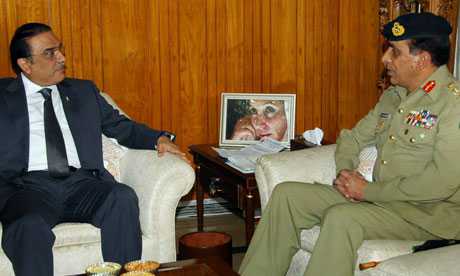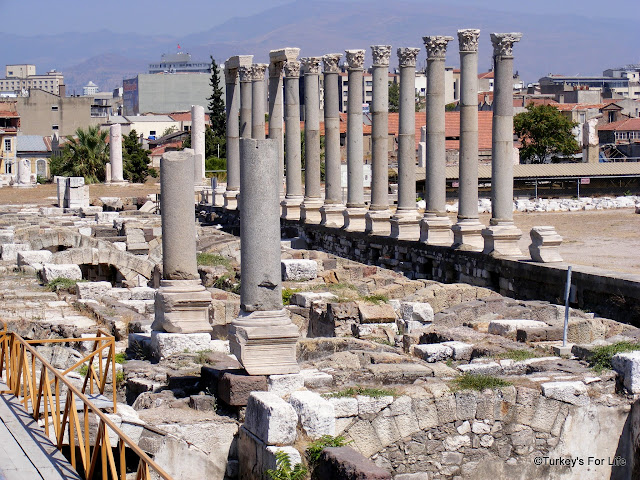Comments alleged to be from WikiLeaks US embassy cables say Indian generals are genocidal and New Delhi backs militants

Pakistan’s president Asif Ali Zardari with army chief General Ashfaq Kayani. Pakistani newspapers have written much about Zardari’s preoccupation with death but little about the army. Photograph: AFP/Getty Images
They read like the most extraordinary revelations. Citing the WikiLeaks cables, major Pakistani newspapers this morning carried stories that purported to detail eye-popping American assessments of India’s military and civilian leaders.
According to the reports, US diplomats described senior Indian generals as vain, egotistical and genocidal; they said India’s government is secretly allied with Hindu fundamentalists; and they claimed Indian spies are covertly supporting Islamist militants in Pakistan’s tribal belt and Balochistan.
“Enough evidence of Indian involvement in Waziristan, Balochistan,” read the front-page story in the News; an almost identical story appeared in the Urdu-language Jang, Pakistan’s bestselling daily.
If accurate, the disclosures would confirm the worst fears of Pakistani nationalist hawks and threaten relations between Washington and New Delhi. But they are not accurate.
An extensive search of the WikiLeaks database by the Guardian by date, name and keyword failed to locate any of the incendiary allegations. It suggests this is the first case of WikiLeaks being exploited for propaganda purposes.
The controversial claims, published in four Pakistani national papers, were credited to the Online Agency, an Islamabad-based news service that has frequently run pro-army stories in the past. No journalist is bylined.
Shaheen Sehbai, group editor at the News, described the story as “agencies’ copy” and said he would investigate its origins.
The incident fits in with the wider Pakistani reaction to WikiLeaks since the first cables emerged.
In the west, reports have focused on US worries for the safety of Pakistan’s nuclear stockpile, or the army’s support for Islamist militants such as the Afghan Taliban and Lashkar-e-Taiba, the group blamed for the Mumbai attack.
But Pakistan’s media has given a wide berth to stories casting the military in a negative light, focusing instead on the foibles of the country’s notoriously weak politicians.
Editors have pushed stories that focus on president Asif Ali Zardari’s preoccupation with his death, prime minister Yousaf Raza Gilani’s secret support for CIA drone strikes and tales of a bearded religious firebrand cosying up to the US ambassador.
Among ordinary citizens, the coverage has hardened perceptions that Pakistani leaders are in thrall to American power.
Pakistan has become “the world’s biggest banana republic”, wrote retired diplomat Asif Ezdi last week.
Military and political leaders, portrayed as dangerously divided in the cables, have banded together to downplay the assessment.
“Don’t trust WikiLeaks,” Gilani told reporters in Kabul last weekend. Beside him president Hamid Karzai of Afghanistan, also tarred in the dispatches, nodded solemnly.
On Saturday the army, having stayed silent all week, denied claims that army chief General Ashfaq Kayani “distrusted” the opposition leader Nawaz Sharif. Kayani “holds all political leaders in esteem”, a spokesman said.
Meanwhile conspiracy theorists, including some journalists, insist Washington secretly leaked the cables in an effort to discredit the Muslim world; the Saudi ambassador described them as propaganda.
But senior judges favour their publication. Dismissing an attempt to block WikiLeaks last week, justice Sheikh Azmat Saeed said the cables “may cause trouble for some personalities” but would be “good for the progress of the nation in the long run”.
The lopsided media coverage highlights the strong influence of Pakistan’s army over an otherwise vigorous free press.
This morning’s stories disparaging Indian generals – one is said to be “rather a geek”, another to be responsible for “genocide” and compared to Slobodan Milosevic – is counterbalanced by accounts of gushing American praise for Pakistan’s top generals.
The actual WikiLeaks cables carry a more nuanced portraits of a close, if often uneasy, relationship between the US and Pakistan’s military.
But the real cables do contain allegations of Indian support for Baloch separatists, largely sourced to British intelligence assessments.
Pakistan’s press is generally cautious in reporting about its own army. But some internet commentators said the latest WikiLeaks story was a bridge too far.
via Pakistani media publish fake WikiLeaks cables attacking India | World news | The Guardian.





